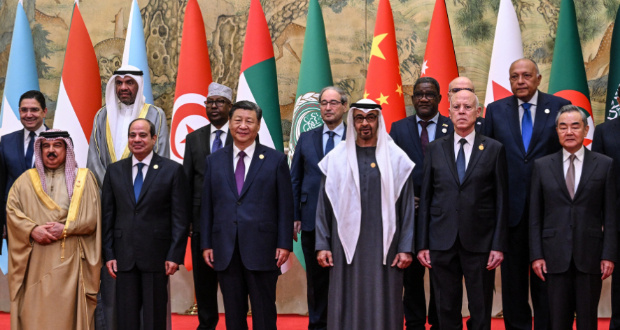Speaking at the 10th ministerial conference of the China–Arab States Cooperation Forum held on 30 May in Beijing, Xi Jinping hailed a ‘new era’ of Chinese–Arab relations. In the Middle East, where the United States’ influence looms large, China is pursuing an active regional strategy to carve out a greater political role for itself, deepen its economic ties, and form coalitions among countries of the Global South to counterbalance the US and its G7 allies in the emerging multipolar world order. Beijing’s appeal may grow in the current geopolitical climate, but it must contend with the enduring security and economic clout of the US.
China seeks a wider political role but limits engagement
As a sign of China’s ambitions to play a greater political role in the Middle East, Beijing has intensified its advocacy for the Palestinian cause since the start of the Israel–Hamas war in October 2023. The China–Arab forum’s final communiqué (the ‘Beijing Declaration’), called for an international peace conference to settle the conflict. The communiqué also condemned Israel’s invasion of Rafah and the United States’ exercising of its veto over resolutions on Palestinian statehood at the United Nations Security Council. At other international fora China has taken a similarly vocal pro-Palestinian stance and has attempted to mediate reconciliation between Fatah and Hamas, hosting them for talks in Beijing. During proceedings at the International Court of Justice in February, China defended the Palestinians’ right to armed resistance against Israel’s illegal occupation of Palestinian territories.
Beijing also used the China–Arab forum as an opportunity to make inroads with Arab states it had previously neglected. China established a comprehensive strategic partnership agreement with Bahrain, which holds strategic significance for China due to its close defence and security ties with the United States and its current presidency of the Arab League. Among North African states, China signed a strategic-partnership agreement with Tunisia and held high-level meetings with Libyan Prime Minister and Foreign Minister Abdul-Hamid Dbeibah in Beijing.
Ironically, China owes much of its political success in the Arab world to its main rival, the United States. As surplus regions with trillions of dollar-denominated assets, China and the Gulf states share concerns over the United States’ unprecedented weaponisation of trade, finance and technology against Russia. Moreover, the United States’ perceived inconsistent enforcement of international law in Ukraine and Gaza has severely undermined its claims to uphold the international rules-based order. According to the US-based Arab Barometer, the United States’ standing amongst ordinary Arab citizens has declined ‘dramatically’ compared to 2022; its latest polling from late 2023 and early 2024 ‘made it clear that the United States’ loss has been China’s gain’.




